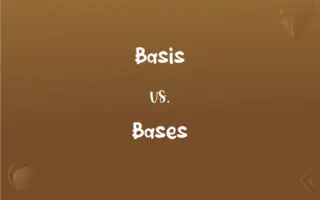Non-Formal Education vs. Informal Education: What's the Difference?
Edited by Aimie Carlson || By Janet White || Published on February 16, 2024
Non-formal education is structured and organized outside traditional school systems, while informal education happens through life experiences and interactions without a formal curriculum.

Key Differences
Non-formal education is typically organized and structured but occurs outside the formal academic curriculum, like in community education, workshops, and vocational training. Informal education, on the other hand, is unstructured, incidental, and often occurs naturally as part of daily life and interactions.
In non-formal education, there is often a clear objective or learning outcome, and it may be facilitated by educators or trainers. Informal education lacks specific objectives or planned outcomes, occurring spontaneously, such as learning from family, peers, or media.
Non-formal education can be tailored to specific groups based on age, occupation, or interest, providing flexibility and relevance. Informal education is ubiquitous and continuous, happening throughout one’s life, often without conscious realization.
Non-formal education frequently complements formal education by filling gaps or offering alternative learning opportunities, while informal education is an organic process of acquiring skills, values, and knowledge from daily experiences.
Comparison Chart
Structure
Organized and structured
Unstructured and incidental
ADVERTISEMENT
Setting
Outside traditional school systems
Occurs in everyday life
Objectives
Clear learning outcomes
No specific learning objectives
Facilitation
Often facilitated by educators
Spontaneous and self-directed
Nature of Learning
Complements formal education
Continuous and lifelong
Non-Formal Education and Informal Education Definitions
Non-Formal Education
Often tailored to specific groups or interests.
She attended a non-formal education workshop on digital marketing.
ADVERTISEMENT
Informal Education
Unstructured, without formal curriculum or objectives.
Informal education happens when children learn from playing with peers.
Non-Formal Education
Can include community education, vocational training.
Vocational training centers provide non-formal education in various trades.
Informal Education
Continuous process throughout one's life.
Through travel, he received informal education in various cultures and languages.
Non-Formal Education
Structured learning outside formal academic systems.
The community center offers non-formal education in skills like carpentry.
Informal Education
Acquiring skills and knowledge spontaneously.
Watching documentaries is a form of informal education about the world.
Non-Formal Education
May have specific learning objectives, but less formal.
Non-formal education programs help adults complete their high school education.
Informal Education
Learning that occurs naturally in everyday life.
She gained her cooking skills through informal education from her grandmother.
FAQs
Can non-formal education lead to certification?
Yes, it can lead to certificates, especially in vocational training.
Is informal education recognized by educational institutions?
Typically, it's not formally recognized with certificates or degrees.
Where does non-formal education commonly occur?
In community centers, workshops, and training programs.
What is non-formal education?
It's structured education that occurs outside traditional academic settings.
How does informal education differ?
It's unstructured learning that happens naturally in everyday life.
Do non-formal education programs have instructors?
Often, they are facilitated by educators or trainers.
How does informal education impact lifelong learning?
It plays a key role in continuous, lifelong learning.
Does informal education include reading books?
Yes, reading for personal interest is a form of informal education.
What are examples of informal education?
Learning cooking from family or understanding politics through media.
Are non-formal education programs flexible?
They often offer more flexibility than formal education systems.
How do hobbies relate to informal education?
Hobbies are a way of gaining informal education in specific interests.
How does media consumption relate to informal education?
Media consumption, like watching documentaries, is an informal educational tool.
Can non-formal education address specific community needs?
Yes, it's often tailored to meet the needs of specific communities.
Can non-formal education be a part of professional development?
Yes, it's often used for skill enhancement and career advancement.
Is travel considered informal education?
Yes, travel can provide informal education about cultures and places.
Do companies provide non-formal education for employees?
Many companies offer training programs, a form of non-formal education.
Are online courses considered non-formal education?
They can be, especially if they're outside formal academic credit systems.
Can non-formal education complement formal education?
Yes, it can complement and enhance formal educational experiences.
Does informal education require enrollment?
No, it occurs naturally without the need for formal enrollment.
How does social interaction contribute to informal education?
Social interaction is a key way individuals gain informal education through shared experiences and discussions.
About Author
Written by
Janet WhiteJanet White has been an esteemed writer and blogger for Difference Wiki. Holding a Master's degree in Science and Medical Journalism from the prestigious Boston University, she has consistently demonstrated her expertise and passion for her field. When she's not immersed in her work, Janet relishes her time exercising, delving into a good book, and cherishing moments with friends and family.
Edited by
Aimie CarlsonAimie Carlson, holding a master's degree in English literature, is a fervent English language enthusiast. She lends her writing talents to Difference Wiki, a prominent website that specializes in comparisons, offering readers insightful analyses that both captivate and inform.








































































